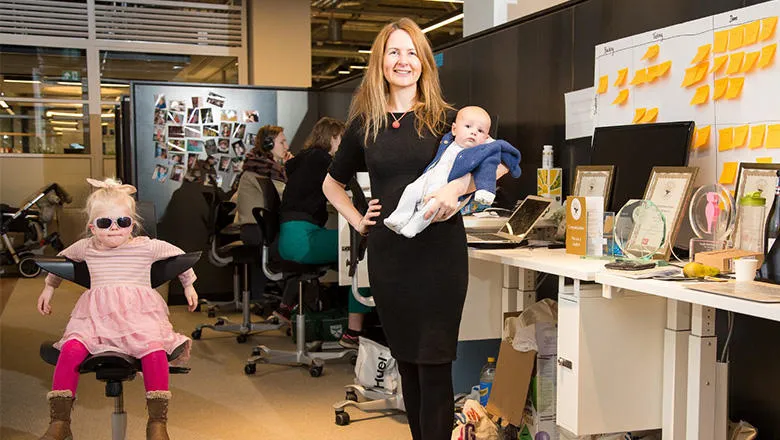27 September 2018
Leaning in is not enough – it is workplaces, not women, that need to change
Zoe Young, organisational sociologist, writer and consultant
Flexible workplaces are essential for women's progress

Image of Rachel Carrell, CEO of KoruKids, by Fiona Freund, creator of #MotherWorks www.wearemoi.net
For the last five years I have been collecting stories – stories of women crafting lives that combine career jobs with family care and who use flexible working patterns to do it.
They are women who are at the life stage when careers stall and they disappear from the pipeline to top jobs, and their stories are not ones we often get to hear. This is partly because in the UK there simply aren’t many opportunities for part-time or flexible working at the more senior levels, and as we know, there certainly aren’t as many women as men up at those levels in corporate and public life.
What women at the forefront of flexible working in pipeline roles think, feel and do tells us much about what works and about what needs to change in policy, organisations and the family to make career jobs more flexible, workplace cultures more caring, and men and women more equal in employment and family life.
Let me tell you about Emma.
Emma progressed quickly during the first 10 years of her career, faster than her partner who works in the same profession. But right now she feels that her career has plateaued and his is taking off. They have three children aged two, six and eight and depend on a combination of school, breakfast and after-school clubs, a nursery, a childminder, and her recently retired mother’s support to make time available for their paid work. Emma and her husband both work full-time and they always have. For the first time Emma is about to cut her working hours by one day a week and work from home a little more. She says:
‘I mean, I do what I need to do [to do my job] but I can’t do more, and doing more is how you develop your career … the day-to-day grind of family life you know? It was like someone had let the air out of the balloon. I thought, “I just can’t do this anymore.” Something had to give.’
Like most of the 30 women I interviewed before, during, and after their transitions into a flexible work arrangement for my research at the University of Sussex, which is published this month, Emma is making room for motherhood by choosing flexibility. And like all women, she isn’t choosing to end her career. She is choosing what she hopes will be an arrangement that offers a better work-life balance, and at that moment in her particular childcare and relationship circumstances she feels she has little choice to do anything else.
In Emma’s story, she acknowledges that ‘doing more’ is what makes careers. Giving more time, taking on more tasks, being more visible at work – if this is what it takes to advance, then people who have less time and who need to operate restricted schedules are inevitably marginalised. That career advancement is predicated on input of hours is a problem for gender progress; it works against even well-intentioned organisational initiatives to promote flexible working at more senior levels.
How did it work out for Emma? She got the work-life balance that she was looking for, right? Well, yes and no. Paradoxically perhaps, most women found that making seemingly small adjustments to their working hours – reducing work time by half a day or a day a week – found that it created more work for them. Work that involved redesigning their roles while they were doing them, compressing unadjusted full-time workloads into fewer hours, actively managing their absences that were left unfilled by the organisation, and tackling biased and limiting attitudes that make sustaining a professional, flexible, working motherhood feel out of reach. Sarah gives a good example:
‘After a few months our manager took us to one side and said, “Look, I might be a dinosaur, but can you stop telling people that you’re a job-share because they’ll think you’re a bit rubbish.”’
Many of the women I spoke to were the first and only people at their levels in their organisations to work part-time, in job-shares and from home or other places. They feel a terrific sense of personal responsibility for the success of their arrangement, both for their own continued inclusion in the workplace, and towards the collective category of women who consider themselves – or aspire to be – both professionals and mothers, not one or the other.
Women working flexibly in senior roles because of their motherhood go to great lengths to fit in to inflexible organisational structures, processes and cultures not designed with them in mind, often with consequences for their wellbeing, job satisfaction, and intention to stay with their employer. It needs to be the other way around. Organisations need to flip the default and ask why can’t a job be done flexibly and then do something about the answers. In short, women are already leaning in enough. It is time for organisations to adapt to meet them.
Zoe Young is an organisational sociologist, writer and consultant. She researches gender, work and organisation with a particular focus on women in leadership and management. She founded the consultancy Half the Sky to work with organisations seeking to address the structural and cultural barriers that hold women back at work. She completed her PhD at the University of Sussex. Prior to this, she worked in HR and management consultancy for many years. Her book Women’s Work: how mothers manage flexible working in careers and family life is published by Bristol University Press in September 2018.
